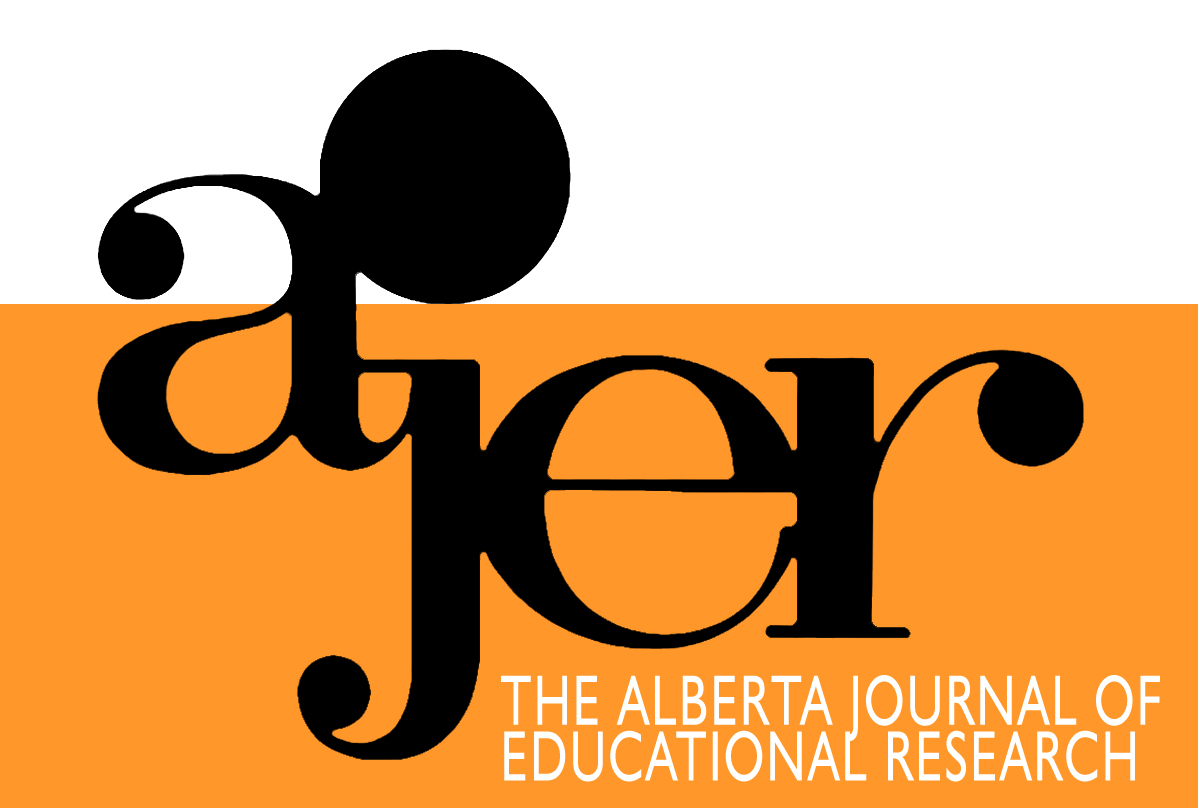Storying and Re-storying Indigenous Content, Perspectives, and Histories in an Elementary Arts Based Curricular Experience
DOI:
https://doi.org/10.55016/ojs/ajer.v66i1.61667Abstract
As part of a larger study focusing on the interdependence of creative and critical curricula, this research examines how an arts experience in an elementary school was re-storied, with the guidance of local and place-based First Nation community members, as an exploration of decolonizing curriculum. A school-based musical theatre experience titled Re-Storying Canadian History, which intended to address concerns about Canada’s 150th anniversary, served as a critical and creative medium for increasing awareness of the existing plurality of First Nation identities, cultures, and languages. Framed as a case study, the experiential narratives of elementary school students and their educators provided a space, a time, and a place to initiate and to discuss decolonization processes in elementary school curricula. Three interpretive devices, storying and re-storying, broadening, and burrowing engaged educators and their students in reconnecting teaching and learning with Indigenous content, perspectives, and histories.
Key words: Storying and Re-Storying, Decolonization, Arts Based Research, Creative and Critical Curriculum, Truth and Reconciliation Commission
S'insérant dans le cadre d’une plus grande étude portant sur l’interdépendance de la criticalité et de la créativité des programmes d’études, cette recherche examine la réitération d’une expérience artistique dans une école élémentaire sous la direction de membres de la communauté locale des Premières Nations comme une étude de la décolonisation du curriculum. L’école a présenté une production de théâtre musical intitulée Re-Storying Canadian History (Reprise de l’histoire du Canada) dont le but était d’aborder des préoccupations quant au 150e anniversaire du Canada. La présentation a servi d’instrument critique et créatif pour mieux faire prendre conscience de la pluralité des identités, des cultures et des langues des Premières nations. Présentés comme une étude de cas, les récits expérientiels des élèves de l’élémentaire et leurs enseignants offraient un espace, un moment et un lieu à l’initiation et à la discussion de processus de décolonisation dans les programmes d’études de l’élémentaire. Trois outils interprétatifs — la narration et la narration par réitération, l’élargissement et l’enfouissement —
ont guidé les élèves et leurs enseignants alors qu’ils retissaient les liens entre l’enseignement et l’apprentissage et les récits, le contenu et les perspectives autochtones.
Mots clés : narration et narration par itération, décolonisation, recherche basée sur les arts, curriculum créatif et curriculum de base, Commission de vérité et réconciliation
Downloads
Published
Issue
Section
License
UNIVERSITY OF ALBERTA COPYRIGHT LICENSE AND PUBLICATION AGREEMENT
If accepted, authors will be asked to sign a copyright agreement with the following points:
A. Where there is any inconsistency between this Copyright License and Publication Agreement and any other document or agreement in relation to the same subject matter, the terms of this Agreement shall govern.
B. This document sets out the rights you are granting in relation to publication of your article, book review, or research note entitled (the “Article”) through inclusion in the academic journal titled Alberta Journal of Educational Research (the “Journal”) published through the Faculty of Education, representing the Governors of the University of Alberta (the “Journal Editor”).
C. There will be no payment to you for this publication and grant of rights. In consideration of the agreement to publish the Article in the Journal:
1. You are warranting that:
- the content of the Article is your original work, and its content does not contain any material infringing the copyright of others; or, where the Article is not entirely your original work, you have obtained all necessary permissions in writing to grant the rights you are giving in this agreement;
- the content of the Article does not contain any material that is defamatory of, or violates the privacy rights of, or discloses the confidential information of, any other person;
- the Article has not been published elsewhere in whole or in part, and you will not allow publication of the Article elsewhere without the consent of the Journal Editor;
- the names of all co-authors and contributors to the Article are:
2. You agree to license the copyright in the Article to the Journal Editor, on a worldwide, perpetual, royalty free basis; and to the extent required by the terms of this agreement. You shall retain the right at all times to be acknowledged as the/an author of the Article.
3. You further agree that the Journal Editor has the entitlement to deal with the Article as the Journal Editor sees fit, and including in the following manner;
- The right to print, publish, market, communicate and distribute the Article and the Journal, in this and any subsequent editions, in all media (including electronic media), in all languages, and in all territories, ing the full term of copyright, and including any form of the Article separated from the Journal, such as in a database, abstract, offprint, translation or otherwise, and to authorize third parties to do so;
- The right to register copyright of the Journal;
- The right to edit the Article, to conform to editorial policy as the Journal Editor sees fit.
4. If any co-author or contributor to the Article does not sign this agreement, the Journal Editor reserves the right to refuse to publish the Article.



